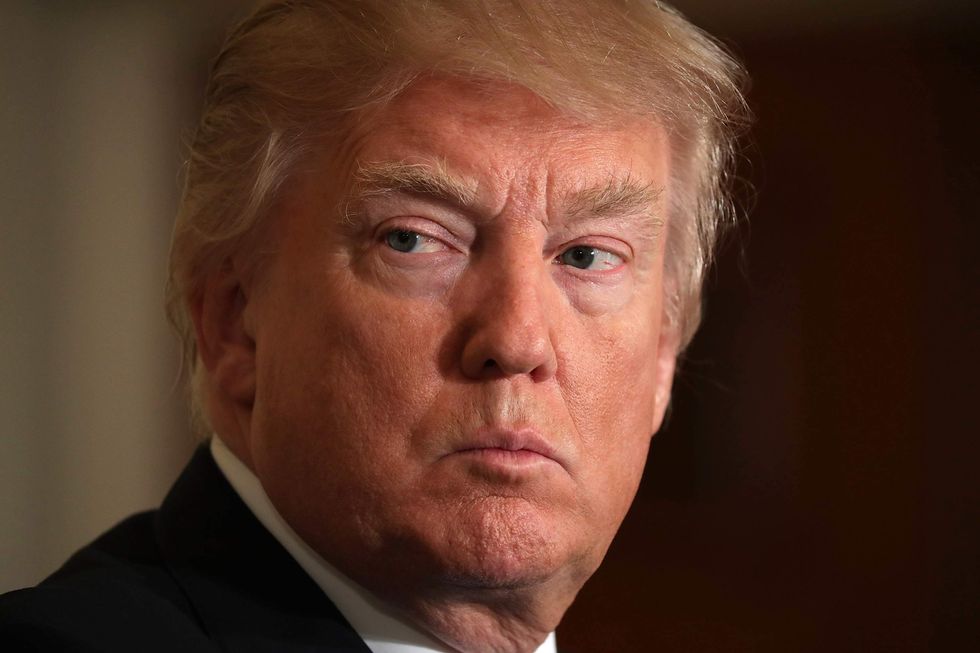
President Donald Trump faces backlash from conservatives over the Republican Senate health care bill to replace Obamacare. (Chip Somodevilla/Getty Images)

Senate Republican leaders unveiled Thursday their plan to replace Obamacare — but many conservatives were not impressed by what they saw.
The Senate bill, called the Better Care Reconciliation Act of 2017, was revealed one month after the Republican-led House of Representatives passed its version of health care reform, known as the American Health Care Act.
As the Senate "discussion draft" was released publicly for the first time Thursday, FreedomWorks Director of Public Policy and Legislative Affairs Jason Pye began poring over the 131-page bill. It didn't take him long, however, to realize that the legislation was a farce.
Despite Republicans promising for seven years to repeal and replace Obamacare, including massive Medicaid expansion, Pye said that what the Republicans' bill would do instead is ensure that Medicaid recipients who are currently covered under Obamacare — at taxpayers' expense — will retain "permanent" coverage.
According to the National Review, the Better Care Reconciliation Act would keep in place block-grant Medicaid funding. The only difference would be in how the funds are administered. Instead of the federal government allocating the funds, as is the case under Obamacare, the states would eventually accept that responsibility. But the transition from federal oversight of Medicaid to state oversight wouldn't come overnight.
The Senate bill calls for a three-year period, from 2018-2021, during which states receive a combined $45 billion from the federal government to help "stabilize" the health insurance market.
After that, states would assume the responsibility of ensuring the stabilization of the market, not the federal government.
That means that in 2024 — a presidential election year — Republicans and Democrats would almost surely wind up back in the middle of a heated Medicaid expansion debate. "Do you think that was intentional?" TheBlaze asked Pye Thursday of the timing.
"Yeah, of course. Of course, it was intentional," Pye responded, suggesting that he thinks Republicans somehow plan to use the issue to try to advance their political agenda. "You're going to make this an election year issue, so they are going to have to extend it [Medicaid expansion]."
Pye also said that Republicans are creating a "very likely scenario" where in 2024 "we'll be just extending Medicaid expansion permanently."
"Every three years, we'll probably just reauthorize it to make sure that people who are on Medicaid through this expansion don't lose their coverage," Pye predicted, seeming unsure of how Republicans might use more government subsidized health care to their advantage.
"I don't know if they're going to be doing it for political purposes to say, 'we're expanding health care.' I don't know if that will be the line or not. But they're setting it up where it will remain in place permanently or at least they'll keep extending it out every so often," Pye said.
Pye wasn't the only conservative disappointed in the Senate Republicans' health care bill. FreedomWorks President Adam Brandon said in a statement posted to the group's website that the bill is "not a repeal" of Obamacare. Rather, Brandon said, it is "an amendment to Obamacare."
For more than seven years, Republicans ran on repealing Obamacare, and voters responded by giving the GOP a majority in the House in 2010, control of the Senate in 2014, and the White House in 2016. Leader Mitch McConnell even said he would repeal Obamacare ‘root and branch.’ This bill, however, breaks those promises," Brandon said.
Republican Sens. Mike Lee (Utah), Ted Cruz (Texas), Rand Paul (Ky.), and Ron Johnson (Wis.) agreed.
In a joint statement Thursday, the four conservative senators announced that they would not vote for the bill in its current form.
“There are provisions in this draft that represent an improvement to our current health care system but it does not appear this draft as written will accomplish the most important promise that we made to Americans: to repeal Obamacare and lower their health care costs," the statement read.
In addition to effectively kicking the can down the road on Medicaid expansion, the Senate bill would repeal almost all of the new taxes imposed by Obamacare, while keeping in place (with different eligibility criteria) most of the law's health insurance subsidies.
Like the House bill, the Senate bill would defund Planned Parenthood for one year and eliminate the Obamacare mandate, which currently requires every American to purchase health insurance, or pay a penalty.
The Senate version would also prohibit states from further expanding Medicaid, as well as freeze Medicaid enrollment.
The Senate bill is unlike the House bill, however, in that it would not allow individual states to deny individuals coverage if they have a pre-existing condition. The House bill calls for an end to Medicaid expansion funding in 2020, according to the Committee for a Responsible Federal Budget.
Although President Donald Trump celebrated the House passing the American Health Care Act last month, he now says the bill passed in the lower chamber is "mean." On Thursday, the president took to Twitter in praise of the Senate bill.
"I am very supportive of the Senate #HealthcareBill. Look forward to making it really special! Remember, Obamacare is dead," Trump tweeted.
During the 2016 presidential campaign, Trump advocated for what amounts to universal health care.
"I am going to take care of everybody. I don't care if it costs me votes or not. Everybody's going to be taken care of, much better than they're taken care of now," Trump told CBS's Scott Pelley during a September 2015 "60 Minutes" interview.
When Pelley pressed Trump on who would pay for his plan, the then-presidential candidate said, "the government's going to pay for it, but we're going to save so much on the other side."